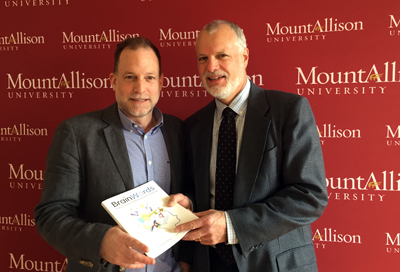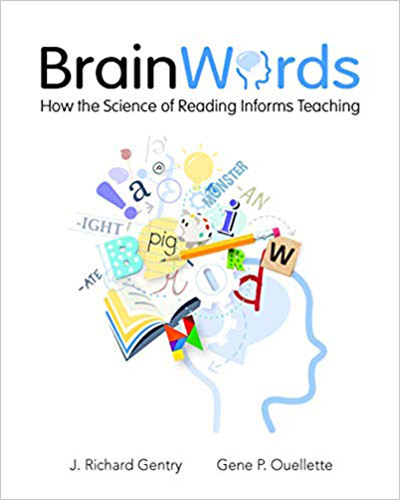Brain Words — the psychology of learning to read
Mount Allison professor examining literary skills, science of reading
Dr. Gene Ouellette, Mount Allison University associate psychology professor has had a couple of banner years. Along with receiving multi-year funding from both the Natural Sciences and Engineering Research of Canada (NSERC) and the Social Sciences and Humanities Research Council of Canada (SSHRC) in 2018 — a rarity for academic researchers — Ouellette’s first book, Brain Words – How the science of reading informs teaching, coauthored with Dr. Richard Gentry was released earlier this year.
 “The book was always a long-term goal,” says Ouellette. “Brain Words is aimed at educators and teachers to be. Our goal is to help connect the research and teaching worlds, to link research on reading to teaching approaches being used and hopefully provide additional applications for the classroom.”
“The book was always a long-term goal,” says Ouellette. “Brain Words is aimed at educators and teachers to be. Our goal is to help connect the research and teaching worlds, to link research on reading to teaching approaches being used and hopefully provide additional applications for the classroom.”
Ouellette says the book seeks to give more insight into the ‘how’ and ‘why’ of child reading processes and includes assessment and teaching applications for a variety of ages as well as sections on learning disabilities such as dyslexia.
Along with his first book, Ouellette has also received research grants from both NSERC and SSHRC for his work looking at how children learn to read and connections between reading skills and spelling skills. Currently entering the second year of both studies, the NSERC research is being done in collaboration with researchers at Montreal’s Concordia University while the SSHRC study focuses on New Brunswick schools.
“The NSERC work is more theoretical. We are working with Concordia to study students in middle school, high school, and university to learn more about how people become highly-skilled in literacy. We are especially interested in better understanding the connections between memory, reading, and spelling,” explains Ouellette. “Good readers are not always good spellers, yet both reading and spelling tap shared memory processes. We’re working to explore this; we started with a group of highly-skilled readers, and also recently began similar work with middle- and high- school students. In the future, we would like to extend this line of study to adolescents and adults with lower literacy levels, and to make connections with adult literacy programs.”
 Ouellette’s SSHRC-funded study, Storybooks, oral vocabulary, and learning to read: Exploring causal connections, recently finished the first of four years of study. Working with retired and supply teachers, as well as student researchers in local kindergarten classes, Ouellette has been looking at the role oral language plays when children are being read to and learning to read. The team has been piloting a storybook and spelling instructional method to teach new words; they will be reviewing the data over the summer months. They plan to use the results to expand the study into Grades 1 and 2 (English instruction) in New Brunswick schools.
Ouellette’s SSHRC-funded study, Storybooks, oral vocabulary, and learning to read: Exploring causal connections, recently finished the first of four years of study. Working with retired and supply teachers, as well as student researchers in local kindergarten classes, Ouellette has been looking at the role oral language plays when children are being read to and learning to read. The team has been piloting a storybook and spelling instructional method to teach new words; they will be reviewing the data over the summer months. They plan to use the results to expand the study into Grades 1 and 2 (English instruction) in New Brunswick schools.
“Our hope is to learn more about how children learn to read and the connections with vocabulary and use of storybooks,” says Ouellette. “If we can share these results and help bridge the gap between research and practice, our work can hopefully help with reading instruction and literacy rates long-term.”
Along with a busy research program, Ouellette teaches courses in psychology of language, sports psychology, child and adolescent development, and intro psych. He is also the head coach of the Mount Allison’s women’s soccer team.
Brain Words was published this year by Stenhouse Publishers. It available on their website and at major bookstores.
Photo caption: Psychology professor Gene Ouellette and Mount Allison Provost and Vice-President, Academic and Research Jeff Ollerhead with a copy of Brain Words at the Psychology Department’s annual Research Day held on campus this spring.




